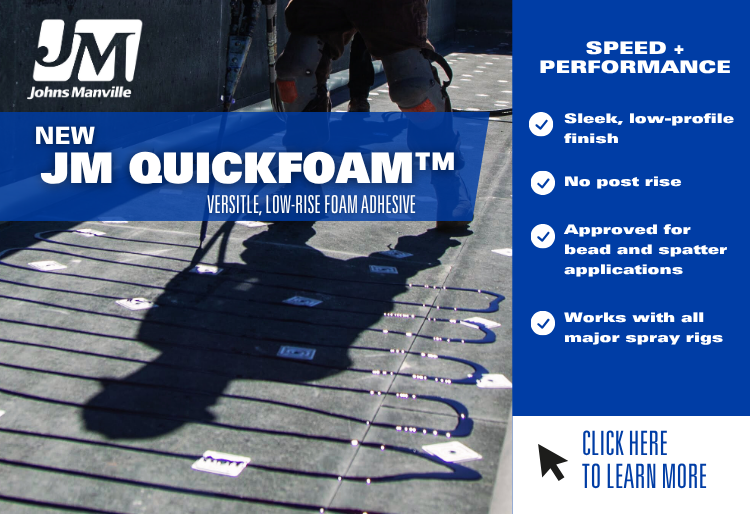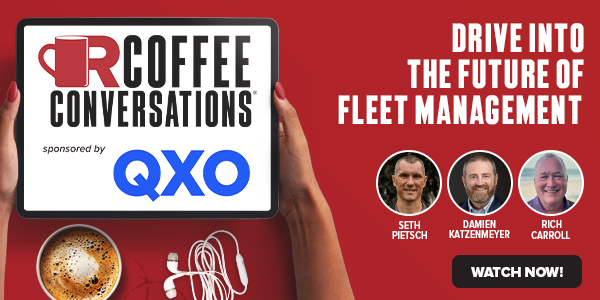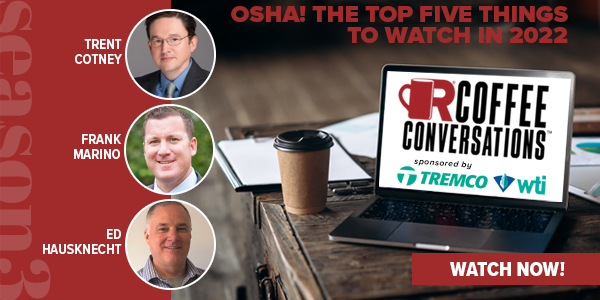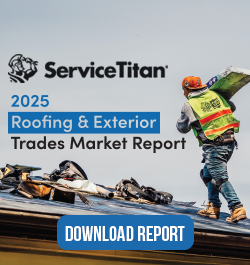Roofing Road Trip with Bill Good Part 1- PODCAST TRANSCRIPTION

Editor's note: The following is the transcript of an interview with Bill Good. You can read the interview below or listen to the podcast here.
Heidi Ellsworth: Hello everyone. This is Heidi Ellsworth, partner with Roofers Coffee Shop and I am here today with Bill Good, former CEO of the NRCA, National Roofing Contractors Association for a Roofing Road Trip with Heidi Podcast from the NRCA fall meetings and I have to tell you, I am so honored to be visiting with you today Bill. We've done a lot together over the years.
Bill Good: We have. We were talking about that before, before this all became real and we've known each other quite a long time and it's a real treat to see you still involved in the industry and to have the opportunity to talk a little bit.
Heidi Ellsworth: Yes. I love seeing you involved in the industry because you are the industry. You, from the very beginning when I started in roofing, it's always been just kind of an honor to know Bill Good and to be a part of what you've done with the NRCA and now you are doing some amazing things with the Roofing Alliance. So, but before we get started on that, why don't you let everybody out there know, what have you been doing since your so called retirement?
Bill Good: So I left my job at NRCA at the end of May in 2017, so about two and a half years and I made one of those classic retirement mistakes, which was to do too much too soon and kind of be afraid to take some time and not do anything. So I found myself among other things, teaching a class at the Citadel, which was in Charleston, South Carolina, which was an amazing experience and then at the same time I was able to keep my fingers in the roofing industry a little bit, doing some work for one of our good NRCA members, doing some work for the Roofing Alliance and doing some work for a foreign manufacturing company that had some interest in the U.S. So it was plenty to keep me busy.
Heidi Ellsworth: Yeah. So you didn't really retire.
Bill Good: What I learned is that was too much and so I've now cut back on a couple of those and doing just enough to keep me busy, but not enough that I don't have some free time.
Heidi Ellsworth: That's great because you do, you deserve it and you've been traveling?
Bill Good: I've been traveling a little, yeah. I mean you know I had a career where I traveled virtually every week, so now I travel once a month. My wife's not sure that's a good move but it definitely gives me more time at home, which is a good thing.
Heidi Ellsworth: That's great. I can appreciate that. I like being at home too and I'm not there very much myself. Well, you know, can you tell us a little bit, our audience about the Roofing Alliance? I think there's still probably a number of people who don't know what the Roofing Alliance is, how it started and since you were so instrumental in that, maybe you can share a little bit of the history and what is it?
Bill Good: Sure it was actually a pretty straight forward concept. When I was at NRCA, I'm going back now 23 years, we had a foundation that existed but it was more or less dormant. We had a little bit of money that had been raised kind of haphazardly over the years, didn't really have a strategic plan for it. We're giving away a little bit of scholarship money every year, but there was nothing strategic behind it. So we made the decision to bring in a consultant to see if there was enough interest in the industry to revitalize this foundation, and part of the confusion I think is that the Alliance is a foundation. It's a separate organization related to NRCA but not managed. It's managed by NRCA, but it's not owned by NRCA, has its own board of trustees, board of directors has its own leadership and all of that, its own governance structure. So the consultant went out and spent a year doing a feasibility study for us, came back and his report was very encouraging. He said, "I think there's enough interest there that you can create an organization that can develop a longterm investment fund, an endowment fund, and you'll be able to operate off of investment income from your endowment fund forever after", and he said, I think importantly he said his recommendation was, "Don't go into this with a predetermined agenda of how you're going to spend the money. Understand that the roofing industry is like all industries I suppose, is always going to have issues. They're going to change over time, but the important thing is to have the right people around the table. So if you have the best and brightest in the industry who have agreed to support this organization, then you'll be able to deal in a very meaningful and strategic way with the issues that are there". One of the questions that we got then, and we still get today is, well, shouldn't NRCA be doing some of these things, and the answer is I think yes and no. NRCA can look at some of the work that the Alliance has been doing and there's some overlap always but at least in my head, the distinction has always been the Alliance can be the forward looking organization that can anticipate needs going forward, can fund things like research programs and fund educational initiatives, look at the mega issues, the big issues facing the industry and begin to wrestle with them without getting into the, necessarily all of the strategies for dealing with them, but to at least identify them and plot a path forward, and so that's kind of been the way that we've operated
Heidi Ellsworth: And so really when people think about this, it's the Roofing Alliance is the foundation of the NRCA, but they're able, like you said, and this has really been true, they're able to look at issues and actually get in front of them. Let's talk about labor shortage and the construction management program and what's going on there. The Alliance has been working on that for a number of years.
Bill Good: Well what's interesting and I think what would surprise people, because I know it surprises people, is the very first project the Alliance undertook, which was back in 1996 was related to the workforce. The leadership of the roofing industry 23 years ago said, "We're going to be facing a worker shortage. We're going to have a workforce issue and we need to start thinking about how we're going to deal with it"
Heidi Ellsworth: 23 years ago.
Bill Good: 23 years ago, and funded a six figured project. We hired the Gallup Organization to do a study of the workforce for us. They interviewed a thousand people, people who had been in the industry, people who had left the industry, people who were thinking about coming into the industry and asked them all kinds of demographic information, but more importantly behavioral kind of questions. What attracted you to the industry? What do you like about it? What don't you like about it? What's your likelihood of staying, and we got some really good feedback from that and in fact it changed a lot of the things that NRCA did. A lot of the programs that NRCA had. One example I can give you is, we learned from that study what we've always known intuitively, which is that roofing foreman are really valuable employees. They have to be. They have to know roofing, they have to be team leaders, they have to be trainers, they have to be communicators. They have to understand the value of communicating with customers because they're going to be the face of the company a lot of the time. So we all knew that. I think everybody in the industry recognized that but when the Gallup people came back to us, they said "This is a critical issue for you because new workers who come to your work for a roofing company expect to be trained, they expect to be respected. They expect to be made part of a crew, but foreman don't really know how to do that. They don't have those skills. It's not that they can't do it, it's that they've never been trained in those kinds of skills. They've been trained to be roofers and then because they're good roofers, they become foreman, but they don't understand that the foreman's job description is different from being a really good roofer". So for NRCA, just that one example, we changed all of our foremen training programs to be from how to be a really good roofer, to be, how to be a team leader, how to be a trainer, how to work effectively with customers, how to be a team builder, all of those kinds of skills and I'd like to think it made a difference. I think at least it was a starting place for us to have that conversation. I think that's kind of a classic example of how the Alliance was able to take an issue, look forward to find the big issues, hand it off to NRCA and say, "Here's what we learned from the study. Now here's some... You guys look at this now and see what kind of changes you can make in the way that we recruit, we train, we develop people in the industry".
Heidi Ellsworth: And we now have the Pro Foreman Program that has been highly successful in the industry with training. So a lot of good things came from that.
Bill Good: So yeah. So in some sense that's a longterm outgrowth of that. That's a little bit of a stretch maybe but I think it's there but more importantly, the Gallup people told us, people come into the trade because they want to be trained and the training in the roofing industry had been, and we're getting better at it, but it had been more or less unstructured with the exception of roofing, of structured union apprenticeship programs. You get away from that, they represent maybe 20 to 30% of the workforce, so you have this other gap to fill and some contractors did a very good job of training, some contractors didn't, a lot were in the middle. So we understood I think as an industry that we need to get more structured to that, and that's led to some of the things that are going on today with the Pro Cert Program and the Pro Foreman Program and other more highly structured, recognizable training programs, part of which is to do training, part of which is to attract people into the industry.
Heidi Ellsworth: Right. Wow, and right now, I mean kind of staying in that theme of trying to be ahead of the curve, the Alliance right now is doing a huge study or funded a huge study of the demographics of the industry.
Bill Good: Right. Yeah. I think it's fair to say the roofing industry has done a pretty poor job of data collecting and again it's an example of where the Alliance can do something that's kind of beyond the purview of NRCA. Certainly beyond the purview of any individual companies in the industry and that is, we want to be able to answer the question, how many people work in the industry, how many roofing companies are there in this industry, and believe it or not, nobody knows the answer.
Heidi Ellsworth: Right. We guess.
Bill Good: I mean the range in my career, the range was always 20000 which is what the Bureau of Labor Statistics used to tell us to maybe 60000 if you add up all the licensed roofing contractors in the country to maybe more than that. If you talk to some of the big distribution companies and ask them how many customers do they have in their database, those numbers get really big. We have Arizona State University working on that problem for us and we've only seen some preliminary results yet, but we think it's going to be a lot different from what a lot of people have thought for a very long time.
Heidi Ellsworth: I'm really excited. I'm really excited to hear about that and see what comes out of that study.
Bill Good: Well, and it helps organizations like NRCA when they go to Congress, for example, and if we can now say, as NRCA can now say, "Hey, there's 50000 of us out there. We represent a lot of people, we represent a lot of voters and we're an industry that's growing. We're an industry that creates fill in the blank number of jobs every year. That by the way pay twice the minimum wage as a starting place on average". So that's a different story than to say, well we're not real sure how many there are, but there's, you know, we feel like there's a lot of us.
Heidi Ellsworth: Right, exactly. Well, and so let's kind of transition that because that really puts us right into one of the areas we wanted to talk about was your involvement with the construction management universities. I know through some of what we've been doing with student competition that did lead towards Arizona and really getting to work with a lot of these universities out there, but why don't we start with, tell us a little bit about what you've been doing with the universities, with the American Council for Construction Education because you're doing some cool stuff there.
Bill Good: Yeah. So let me, if I may go back to the beginning because I think the origins of this tell a pretty powerful story. We were winding down an Alliance meeting, I'm going to say six years ago, and one of our Alliance members, Dennis Conway got up and he said, "I'd like to put an idea out there for us to think about". He said, "I think there's an opportunity for the Roofing Industry to get involved with construction management schools". He happened to be an alum of a very good one at Colorado State and kind of said, "What do you guys think?", and the consensus in the room was, "Well, we really hadn't thought about it, but it sounds great, so let's see what we can do". So Dennis and I paid a visit to the head of the construction management department at Colorado State University who gave us kind of a roadmap and guided us through how we might be able to establish a relationship, and what he told us then was, we need to think of this, the industry needs to think of this as a longterm proposition. We're not going to go into a construction management school tomorrow and change the curriculum and start hiring people, but like anything in life, if you develop the right relationships and establish kind of the right outlook, you'll be able to effect some change. So that's what started it. It's important because it shows once again in life the power of one person having a good idea.
Heidi Ellsworth: Right, right and Dennis has great ideas.
Bill Good: And Dennis has great ideas and that was just one of them, but it started us down this path. So the path has led us to do things like develop a student competition. So every year at the IRE we offer the opportunity for construction management schools to compete in a competition. Competition has always been based on a real life project in the city where the IRE is held. So this next year it's going to be in Dallas and the competition is going to be part of the Dallas Cowboys training facility, which is really cool.
Heidi Ellsworth: Very cool. Yeah.
Bill Good: And this year we'll have nine schools competing. Each of the schools will be assigned a mentor. One or more mentors will generally be Alliance members from all segments of the industry. They'll work with the students, kind of answer some of their questions without giving away the farm is the way that they're coached, and then from the nine, we'll select probably five finalists who will then be flown to the site of the IRE in Dallas this year, put up in a hotel for a couple of nights, participate in the competition and have the opportunity to visit with some Alliance members, see the trade show floor, get exposure to the industry and so on. As a result of that, I can say with pretty much certainty that every student that's been through this experience and we now had quite a few has said, "We had no idea. We had no idea the roofing industry was this big, this complicated, this interesting-
Heidi Ellsworth: This cool.
Bill Good: "This cool. We just thought it was a thing you put on top of the building and to keep water out for a long time and you don't worry about it and now we're seeing some really interesting things going on". So we have that happening. The Alliance most recent endeavor with construction management schools has been to fund the development of the first ever in the history of the universe, I think roofing course, a four credit roofing course that's going to be offered at Clemson University next semester.
Heidi Ellsworth: That is going to be great.
Bill Good: Isn't it cool? Isn't it cool?
Heidi Ellsworth: Yes.
Bill Good: And even cooler, they opened it up for enrollment last week with an expectation of having 15 students in the class. They hit the cap in two days, so they raised the cap to 20 and I don't know if they've hit that yet. I'll find out tomorrow but-
Heidi Ellsworth: But there's interest in roofing on the construction management.
Bill Good: There's interest and it's unique and they get... Students at construction management schools get exposure generally to mechanical, electric and plumbing industries. They get a little bit of knowledge of roofing in materials courses or in design courses or in estimating or safety but nothing roofing specific until now. So now there's this three hour course that's going to be filled and is owned by the Alliance. So it will be transportable to the other 73 schools of construction management in the United States.
Heidi Ellsworth: That is excellent.
Bill Good: And it's a lot of fun.
Heidi Ellsworth: Now before you go on, let's just make sure we... I just want to say how cool the construction management contest is. It's going to be Wednesday morning of IRE and I just want to kind of take this moment to encourage everyone listening to this who's coming to IRE to attend and watch these students present. They were phenomenal. I mean, Tim and I are just totally addicted to sitting and listening and watching these young people who were just so well presented last year.
Bill Good: Yeah. My takeaway has always been, oh my God, when I was 19 or 20 years old, there was no way I could have stood up and done a presentation about something that I had obviously just learned about.
Heidi Ellsworth: Yes.
Bill Good: And then take some really tough questions because part of the program is they take live questions from a panel of judges. They don't know what the questions are ahead of time. They're not prepared to address them, so they have to be thinking on their feet and they have to show some kind of knowledge that they've learned enough about this project to answer those questions intelligently and it was astonishing, wasn't it? They were just so bright and so good and we all want them in the roofing industry.
Heidi Ellsworth: Exactly and then these young students are able to go onto the trade show floor and talk to manufacturers, talk to other contractors, talk to distribution, and really kind of see even that side of our industry. That was really what, kind of, we all love, is that big picture of it and we're actually able now to bring the brightest to come and see that and be a part of our industry. I think it's pretty inspirational for me the last couple of years.
Bill Good: It's very cool. So here's my favorite story. Last year at the competition an Alliance member brought her best customer to the IRE because she wanted her customer to see what kind of things she's involved with in her industry. Brought her customer to the competition. They were both mesmerized by it. At the end of the competition, she walked up to the students and handed out business cards.
Heidi Ellsworth: I love it. I love it.
Bill Good: One of them talked to her and became a summer intern for her this past summer and is now working for her. So it can happen.
Heidi Ellsworth: It can, it can.
Bill Good: It can work.
Heidi Ellsworth: Well, and it shows the care. I mean, a big part of this next generation is they want mentorship. They want equality. They want to be a part of something and the Alliance has been offering that now this is our sixth year, right?
Bill Good: Right. Sixth year.
Heidi Ellsworth: So, they were again, like we talked about earlier, ahead of the curve. Really bringing this in. Thanks to Dennis.
Bill Good: Thanks to Dennis. So when we started this, we had two objectives. One objective was let's make sure that they get education about roofing. There's classroom opportunities to learn about roofing. So we've had some success with that. The Clemson Program I think is a game changer, but we've had some success, and then the other objective of course was to interest people in careers in roofing, and what we learned, and it didn't take long to learn it, is that these students go into these programs imagining they're going to go to work for big general contractor and they don't even think about other career opportunities. They know people who've been through the program before who go to work for Turner or Bechtel or one of those guys. They start up as assistant project managers and over a long period of time, work their way up if they're good and get into more positions of responsibility. So when we have an opportunity to get in front of those students, what we tell them is, "We're an industry of family owned businesses. If you're good and if you work hard and do the stuff that you're supposed to do, you're going to get a lot responsibility right away and if you're really good, you can be making a lot of money. You can have a ton of responsibility, you can think about different career paths that will take you to sales if you like that, it'll take you to manufacturing or distribution if you like. Those kinds of career paths or it can take you to owning your own roofing company, and when you go to work for Bechtel, those are not the conversations that you're going to have". So it's a little bit of an eye opener for them and I think in a really good way. It's not just roofing of course that offers that, but I think we more than other trades do, because we're more family business owned and we're more interesting.
Heidi Ellsworth: Yeah, it is.
Bill Good: Putting roofs on is way cooler than plumbing a building.
Heidi Ellsworth: It is. It is and then what we do, I mean, especially now where there's so much going with green roofs and solar and the use of different materials and performance and technology, robotics on the roof. I mean it really is something that is starting to talk to that next generation of things that they're interested in. It's not your old roofing anymore. It's changed.
Bill Good: No, and when you you talk to, I guess they're generation Z now, when you talk to them about construction and the way that we can have an impact on the environment through roofing, it's not just about keeping buildings dry, it's about saving energy. It's about stormwater management. It can be about solar integration, all of those things. Most of them hadn't thought that way before and when they see that or when they hear about those kinds of opportunities, it's a little bit of a revelation for them. So yeah, I think we've made really good strides there.
Heidi Ellsworth: It is and I think from what I understand too, one of the goals was to make the construction management schools more aware of the roofing industry. So you've been doing that. You are very active with the construction management schools. Maybe tell us a little bit about your board position and what you're doing there.
Bill Good: Sure. So I've had the pleasure of representing the Alliance on the board of trustees for an organization called, The American Council for Construction Education, ACCE, and that body is the body that does the accreditation of construction management school. So like all academic programs, these schools are subject to accreditation and if they get accredited, they have to go through a lot of hoops to get accredited, but if they get accredited, they have the ability to attract higher end students generally into the program. They become better known through the academic community. They become better known even within their own university if they're accredited. So there are, as I said, 74 of them. We're going through the process now of accrediting a few more. There are also for the first time now some accredited, excuse me, master's degrees in construction management and there are some accredited programs at the community college level, two year programs.
Heidi Ellsworth: That is perfect.
Bill Good: So what's happening there and what will continue to happen is roofing going to get integrated into those curricula. When we have this Clemson Program done, that can be, it won't automatically be, but it can be adopted by any of these accredited programs and so we'll have more knowledge coming out of those that are being delivered through those programs than before, and the other thing we've done is the Alliance has been good enough to fund some scholarships and some grants for faculty members at construction management schools. So they've done some of the Alliance's research. So it's just part of, again, a longterm strategy of being part of their strategic thinking and being part of the way that they think about the construction industry.
Heidi Ellsworth: Making sure we're at the dance, you know, we don't want to be left behind by the plumbers and the HPAC.
Bill Good: And we're catching up. We're going to catch up. We're getting there.
Heidi Ellsworth: But you're there and you're talking for us, which is great. So for those of you who are listening to this podcast, you know, I'd really recommend going to roofingalliance.net going to the ACCE website if you even just Google American Council for Construction Education and look and see what construction management schools are close to your business because they can get involved, right?
Bill Good: Yeah. Here's the other interesting piece of that, one of the elements that they must do in order to be accredited is to have an industry advisory board that they work with. Industry advisory boards are composed typically of contractors in the local community, so it's a win, win. The schools love them, having these boards because they're a source of employment. They're a source of jobs for these students to begin to look for afterwards. Obviously for the contractors, this is now a pool of students that they will have the opportunity to get in front of and it's a pool of faculty members that they'll be able to talk to about, not only careers in roofing but the importance of roofing in building construction, some of the changes that have been going on in the industry to make sure those are incorporated into the coursework and all that, and I can tell you that virtually every one of these schools is actively looking for contractors to do that.
Heidi Ellsworth: And it's just such a great networking within their own community looking for talent. Like you said, on getting these young people interested in being involved and just thinking about even on a community college level now that those are getting accredited. If our roofing companies can be involved with what's going on there, it's just going to bring more and more people into roofing.
Bill Good: In these schools, they're all looking for guest lecturers, they're all looking... The ones that enter these competitions and the roofing competition are looking for mentors, people for the students to be able to talk to about maybe not that specific project or you know, specific elements of it, but to talk about what kind of materials should we be thinking about. If we get a question about substitutions of material, what else might work on this kind of a project? What do I need to know about building codes? All of those kinds of things-
Heidi Ellsworth: That they need help with.
Bill Good: They need help with and once the students start asking those questions, they begin to understand, hey, this is a more complex thing than I ever thought it was.
Heidi Ellsworth: Right? Exactly.
Bill Good: I need to learn more about roofing.
Heidi Ellsworth: Well, and for those of you listening who are going to the IRE, I would say go to the student competition and talk to some of the mentors who are there. They're going to be there, and there'll be a lot of roofing contractors there, the judges. Just like you said, that one lady, she was able afterwards to go up, ask questions, you know really one on one and see how this can work in everybody's own backyard, in their own community.
Bill Good: Talk to the faculty members. Each of the teams that competes, we'll have at least one faculty member there with them. So talk to them, ask them what they do at their schools, how they're integrating their local contractor community, what kind of opportunities there are, what kind of things they could be thinking about doing to get involved in a local college or community college.
Heidi Ellsworth: And you know, the last thing I would say on that too is talk to the students. If you see them walking around the show or if you can see them, you know, you really can't see them before the competition. They're a little busy and nervous, but you know, if you get a chance to talk to them, I know my husband Tim loves to talk to all the students. He learns so much and he just is always impressed. So I really want to encourage everybody to do that and Bill, we're going to on... This has been perfect because we've talked about construction management, we've talked about the students, we've talked about what's been going on. So I'm going to end this podcast as part one and we're going to be back in just a few for part two and we're going to talk about Ronald McDonald House.
Bill Good: Very cool.
Heidi Ellsworth: Okay. Thank you so much for listening today. This is Roofing Road Trips with Heidi Podcast. Be sure to check out all of our podcasts on Roofers Coffee Shop. Listen to part two. Thank you so much.























Comments
Leave a Reply
Have an account? Login to leave a comment!
Sign In